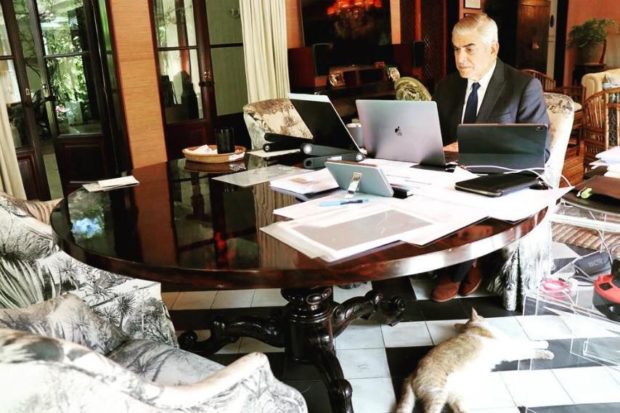PH business must reset: ‘No existing playbook for this’

Jaime Augusto Zobel de Ayala broadcasting from home during the annual stockholders meeting of Ayala Corp. on April 24, 2020. (Photo from AC)
As Luzon heads into an extended enhanced community quarantine (ECQ), Philippine businesses are trying to navigate the “new normal” caused by the new coronavirus disease (COVID-19) pandemic, balancing the need to remain viable while ensuring employees’ health and safety.
“There is no existing playbook for this kind of situation. However, we had reset our planning cycle into three short-term phases to address the current situation and how to move forward with our business in a post-COVID environment,” said Jaime Augusto Zobel de Ayala, chair and chief executive officer of the country’s oldest business house, Ayala Corp.
Zobel sees the Ayala group going into a three-stage process in adjusting to the new situation with the extension of the ECQ to May 15.
The first stage would be to prepare for the safe and effective entry and reentry of its workforce.
The second phase is to ensure business resiliency over a few months after the ECQ and figuring out how to remain productive.
Back to drawing board
“We will be monitoring consumer behavior, market behavior, industry and regulatory shifts this period, just making assessment on how the world has changed for us and how we will need to work in this environment,” Zobel said during the company’s stockholders’ videoconference on Friday.
The third stage will be to transform the business to adjust to a “new normal,” after gathering enough information about the new economic situation.
This will involve going back to the drawing board to develop the group’s longer-term business plan, Zobel said.
During the ECQ, Ayala will continue to operate critical businesses. such as banking, telecommunications, health care, power and manufacturing.
The COVID-19 response package of the Ayala group has amounted to P5.5 billion in the form of employee support, business operations waivers, and monetary and in-kind donations.
Massive disruption
The Federation of Filipino Chinese Chambers of Commerce and Industry Inc. (FFCCCII) said the ECQ was “difficult yet necessary.”
Given the massive disruption to the economy, FFCCCII president Henry Lim Bon Liong said the government must be proactive to prevent what could be the worst economic crisis since World War II.
“We believe that unless the government proactively steps in, we might even exceed the 1984 negative 8 percent contraction in the gross domestic product,” Lim said.
15-point recommendation
FFCCCII submitted a 15-point recommendation to mitigate the adverse economic effects of the pandemic.
These included sustaining and speeding up the “Build, Build, Build” program, and upgrading, modernizing and reducing the costs of telecommunications.
The group also suggested granting wage subsidies to businesses to keep jobs for millions of people, providing financial grants and technical assistance to farmers and fishermen while further lowering interest rates and lessening bank reserves, and suspending interest and principal payments on loans for small business enterprises.
Compensation
The Chinese-Filipino business group said the government could also extend compensation for paid sick leaves for COVID-19 patients and increase investment in public health services and research on infectious diseases.
The low world oil prices should be seized as an opportunity to negotiate long-term, affordable oil and natural gas purchase agreements with major energy exporters while the country invests in nonfossil fuel, even nuclear power, it said.
It also pushed for more investments to upgrade education, especially in nondegree courses like German-style vocational and technical courses.
Recovery plan pushed
Senate President Pro Tempore Ralph Recto echoed the need to put a recovery plan in place for workers and businesses gravely affected by the pandemic, which Sen. Grace Poe said had exacerbated poverty in the country.
“Concerned agencies should work double time so that all forms of assistance reach target families who are in need,” Poe said.
Recto, Poe and other senators, however, were more concerned about slowing if not ending COVID-19 outbreak at this time and urged the Department of Health to step up mass testing for the virus.
“[We should also] invest more on health-care infrastructure,” Recto said.
Senate President Vicente Sotto III and Sen. Sonny Angara said the Senate was ready to discuss the possibility of providing supplemental budget to the government to finance more programs in combatting the health crisis.
Sen. Panfilo Lacson said “the virus dictates our action and not the other way around.”
He told the Inquirer that the ECQ “continues to play its role in social distancing, which undisputedly serves its intended purpose in fighting the virus.”
Extension ‘only buys us time’
Poe said the lockdown extention “only buys us time,” but to defeat the virus would require “massive testing and increased medical capacity.”
Opposition Sen. Francis Pangilinan supported the President’s decision, but said the government should vigorously pursue contact tracing and providing assistance to the people.
“We [must] look to the examples of Singapore, Taiwan and South Korea, which did not impose a lockdown, but seem to successfully contain the spread of the disease and limit the COVID-related deaths,” Pangilinan said.
“All of them, including China, did not completely stop the operation of their public transport systems because they know that it is vital to their people’s survival,” he pointed out. —WITH A REPORT FROM MARLON RAMOS
For more news about the novel coronavirus click here.
What you need to know about Coronavirus.
For more information on COVID-19, call the DOH Hotline: (02) 86517800 local 1149/1150.
The Inquirer Foundation supports our healthcare frontliners and is still accepting cash donations to be deposited at Banco de Oro (BDO) current account #007960018860 or donate through PayMaya using this link.
